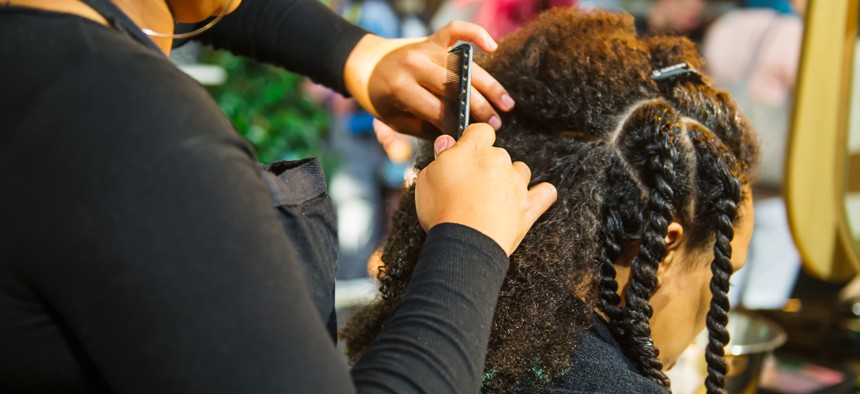Hair Braiders Go to Court Over Licensing Requirements

Okrasyuk/Shutterstock
Twenty-seven states do not require licenses for hair braiding, but in Louisiana braiders must complete 500 hours of hands-on training or risk $5,000 fines.
Louisiana hair braiders are challenging state occupational licensing requirements they say are too onerous after attempts to deregulate the industry through the state legislature failed.
More than half the states in the U.S. do not require hair braiders to obtain licenses in order to do business. Of the 15 states that do require specialty braiding licenses, Louisiana’s mandates are the most onerous, requiring 500 hours of hands-on instruction, according to a recent lawsuit that challenges the requirements.
The Virginia-based Institute for Justice, a libertarian-leaning public interest law firm, brought the case on behalf of several natural hair braiders in Louisiana who said the licensing requirements have harmed their livelihoods.
To legally braid in Louisiana, stylists must obtain an “alternative hair design” permit requiring 500 hours of training from a cosmetology school, and pass a board exam. The lawsuit alleges that of 50 cosmetology schools in the state, only three offer “alternative hair design” and can cost thousands of dollars. Only one of those schools offers a 500-hour license—the others require between 600 and 1000 hours of training.
Neighboring states of Texas, Arkansas and Mississippi do not require braiders to obtain licenses.
Lynn Schofield, one of the hair braiders represented in the case, said she is no longer able to fully staff her salon Afro Touch because she can’t find licensed braiders to work, according to the lawsuit. Braiders face $5,000 fines if they are caught working without a license.
The “irrational licensing requirement” required by the Louisiana Board of Cosmetology deprives hair braiders “of their constitutionally guaranteed right to earn an honest living in the profession of their choosing,” the lawsuit states.
Unlike other hair stylists who work with dyes or cutting tools, natural hair braiders do not use chemicals or sharp objects and therefore shouldn’t be regulated in the same way, the lawsuit argued.
Attorney Jaimie Cavanaugh, who is representing the hair braiders, said the classes they are required to take to receive licenses don’t even teach the skills needed to learn how to properly braid hair because the schools don’t have the instructors needed. Instead, a curriculum outlined in the lawsuit indicates students must take courses on the ancient origin of hair braiding, hygiene and sanitation, and one course on braiding.
“Even someone who wanted to learn how to braid and signed up and went through the curriculum wouldn’t come out knowing how to do that,” Cavanaugh said.
Hair braiding lawsuits have pushed occupational licenses changes in a number of states in recent years. Many of the legal challenges were brought by the Institute for Justice. The Louisiana lawsuit, filed in state court in Baton Rouge, noted that before 2003 hair braiders didn’t need a license in the state.
Supporters of such occupational licensing laws, which can cover everything from electricians to dental hygienists to private investigators, say they are necessary to protect consumers and provide oversight.
Steve Young, executive director of the Louisiana Board of Cosmetology, said he hadn’t yet reviewed the lawsuit but said the requirements are based on “health and safety standards.” He referred calls to an attorney who did not return a call for comment.
Nearly one out of four jobs now require an occupational license, according to the National Conference of State Legislatures.
But there’s growing concern that licensing requirements can create barriers for low-income workers seeking to enter certain professions.
Several states have taken action in recent years to repeal hair braiding or other occupational licensing requirements. In April, Arizona became the first state to allow new residents to transfer their occupational licenses from another state in order to work. Arizona Governor Doug Ducey said the change was needed to easily allow qualified people to work in the state.
Missouri lawmakers simplified hair braider licensing requirements last year after Institute for Justice filed a similar lawsuit. Rather than complete 1,500 hours of hands-on training to obtain a license through the state’s cosmetology board, Missouri hair braiders are now only required to watch an instructional video and register with the state.
Minnesota in May became the 27th state to get rid of licensing requirements for hair braiders.
Andrea Noble is a staff correspondent for Route Fifty.
NEXT STORY: The Lingering, Unresolved Battle Over Short-Term Rentals in One California City





